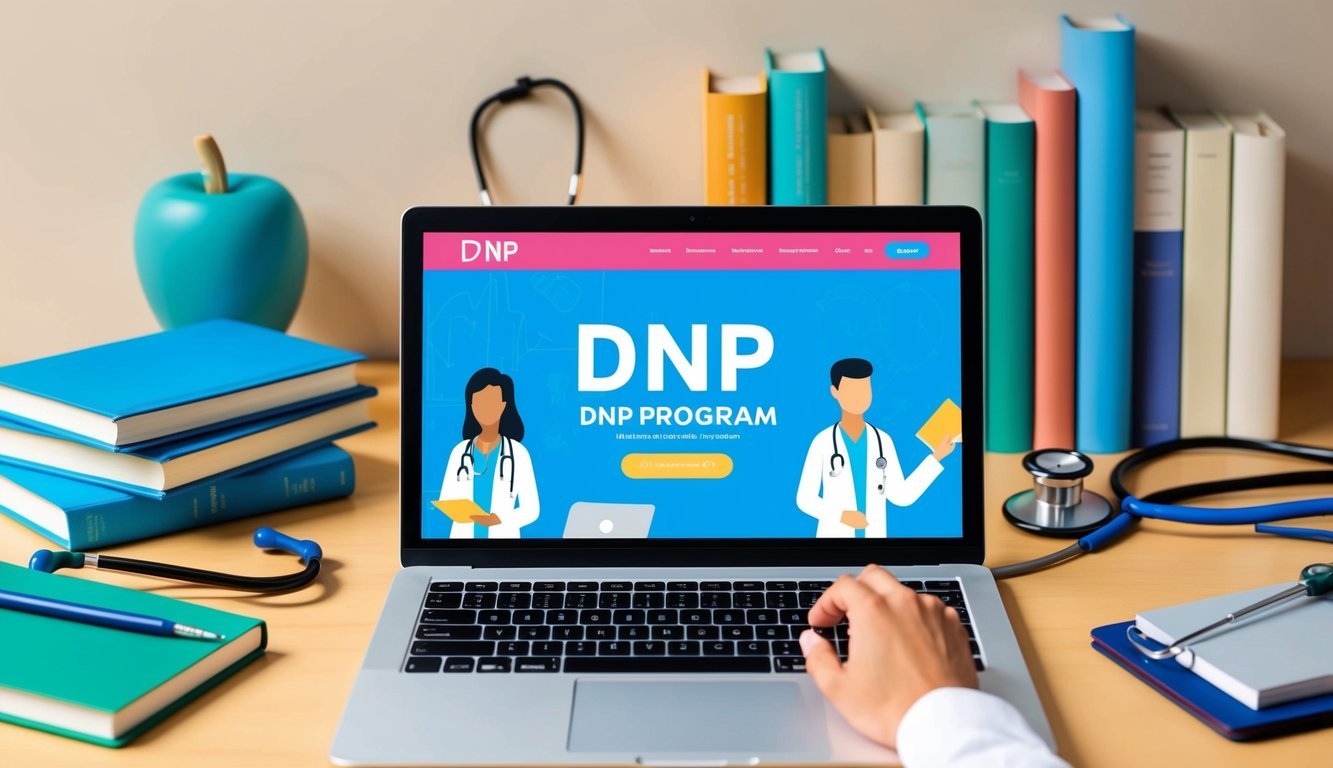If you’re considering advancing your nursing career, you may find an online Doctor of Nursing Practice (DNP) program to be the right choice for you.
This degree prepares you for high-level clinical roles and leadership positions within healthcare.
It equips you with the skills needed to make significant contributions in various specialties.
The flexibility of online learning allows you to balance your studies with professional and personal commitments.
Many institutions offer online DNP programs tailored to different career paths, including family nurse practitioner and executive nurse leadership.
Throughout these programs, you’ll engage in both coursework and practical experiences that are essential for achieving your degree.
The demand for advanced practice nurses continues to rise, making this an opportune time to explore the benefits of pursuing a DNP.
As you research your options, make sure to look for accredited programs that align with your career goals.
These programs often feature coursework that is delivered in both synchronous and asynchronous formats.
This accommodates your schedule while ensuring you receive quality education.
For a comprehensive overview of available online DNP programs, consider visiting resources like Nurse.org and BestColleges.
Overview of the Doctor of Nursing Practice Degree

The Doctor of Nursing Practice (DNP) represents a significant advancement in nursing education, designed to enhance your skills and knowledge in clinical practice.
This degree prepares you to implement evidence-based practices and lead innovative changes in healthcare settings.
Elevating Nursing Practice
The DNP degree focuses on translating research into practice, empowering you to improve patient outcomes.
You will develop advanced clinical competencies that enable you to make impactful decisions in diverse healthcare environments.
Key areas of focus include:
- Evidence-based practice
- Leadership and management skills
- Healthcare policy analysis
As a DNP graduate, you will be equipped to tackle complex clinical problems, lead healthcare teams, and advocate for quality improvement in nursing practice.
This training is crucial as healthcare continues to evolve.
Understanding the Terminal Degree
The DNP is regarded as a terminal degree in nursing, indicating the highest level of education available in the field.
Unlike PhD programs that primarily focus on research, the DNP emphasizes practical application of research findings.
You will engage in rigorous coursework and clinical practice, developing skills that prepare you for leadership roles.
Typical requirements may include:
- Completion of 30-90 credits
- Capstone project or dissertation
This degree positions you to be a change agent in nursing, influencing practice standards and healthcare delivery models.
Online DNP Programs
Online DNP programs offer flexibility for busy professionals seeking to advance their careers.
Many institutions now provide these programs, allowing you to balance your studies with work and personal commitments.
Benefits of online DNP programs include:
- Flexible scheduling
- Access to a diverse range of resources
- Opportunities for networking and collaboration
Programs often require practical components that you will complete in your local area, ensuring that your education is both convenient and relevant.
Institutions like Walden University and Purdue University Global offer comprehensive online DNP options that cater to varying professional needs.
Educational Pathways and Core Competencies

As you consider advancing your nursing career through online Doctor of Nursing Practice (DNP) programs, it’s essential to understand the educational pathways available and the core competencies required.
These pathways are structured to ensure a comprehensive understanding of nursing education and practice at an advanced level.
From BSN to DNP
Transitioning from a Bachelor of Science in Nursing (BSN) to a DNP program equips you with high-level clinical skills and leadership training.
The curriculum typically integrates advanced nursing science with evidence-based practice.
The BSN to DNP pathway often encompasses:
- Clinical rotations: Hands-on experiences in various healthcare settings.
- Specialty tracks: Options such as nurse practitioner, clinical nurse specialist, or nurse educator.
This pathway prepares you for direct patient care roles, emphasizing critical thinking and decision-making in complex situations.
Post-Master’s Options
If you already hold a Master of Science in Nursing (MSN), post-master’s DNP programs provide an excellent opportunity to further enhance your credentials.
These programs typically focus on translating research into practice and refining your leadership skills.
Post-master’s options allow you to delve into:
- Advanced practices: Such as healthcare policy, systems leadership, and quality improvement.
- Project methodologies: Skills to apply evidence-based strategies in clinical settings.
This pathway is designed to elevate your professional practice and prepare you for senior roles within healthcare organizations.
Essential Knowledge Areas
The competencies you will gain through an online DNP program are fundamental to your success as an advanced practice nurse.
Core knowledge areas include:
- Health Policy: Understanding the impact of legislation and regulations on healthcare delivery.
- Evidence-Based Practice: Applying research findings to improve patient outcomes.
- Leadership: Developing strategies to lead teams effectively in various healthcare environments.
Familiarity with these essential areas ensures you are prepared to address complex health issues and advance nursing practice.
You can access more detailed information about these competencies and educational pathways through resources like the American Association of Colleges of Nursing.
Specializations and Clinical Expertise

Understanding the various specializations within the Doctor of Nursing Practice (DNP) programs can help you identify the right path for your career.
These specializations allow you to enhance your clinical expertise and focus on specific areas of healthcare.
Family Nurse Practitioner
The Family Nurse Practitioner (FNP) specialization prepares you to provide comprehensive care across all ages.
As an FNP, you will perform assessments, develop treatment plans, and manage acute and chronic conditions.
This role emphasizes patient-centered care, health promotion, and disease prevention.
Key components of FNP training include:
- Clinical Skills: Mastering diagnostic skills and treatment plans.
- Patient Management: Focusing on continuity of care.
- Education: Empowering patients with knowledge about their health.
Programs like DNP – Family Nurse Practitioner focus on these essential skills, enabling you to excel in diverse settings.
Women’s Health and Midwifery
The Women’s Health Nurse Practitioner (WHNP) and nurse-midwifery programs equip you with the skills to provide care specifically for women.
This specialization covers reproductive health, prenatal care, and menopausal health, allowing you to address a broad range of women’s health issues.
In this field, you will:
- Conduct gynecological exams.
- Manage prenatal and postpartum care.
- Support women through various life stages.
You can pursue a dual certification in nurse-midwifery and WHNP through programs such as the Dual Nurse-Midwifery/Women’s Health Nurse Practitioner to expand your expertise.
Population Health and Primary Care
Population health focuses on improving health outcomes for specific groups, addressing social determinants of health and health disparities.
This specialization emphasizes preventive care, community outreach, and health education.
As a practitioner in this field, you will:
- Analyze health data to inform policy.
- Implement community-based health programs.
- Collaborate with interdisciplinary teams.
DNP programs focusing on Population Health and Primary Care prepare you to lead these initiatives, making a significant impact on community wellness.
Implementing Evidence-Based Practice

In your journey through an online Doctor of Nursing Practice (DNP) program, understanding how to implement evidence-based practice (EBP) is essential.
This section explores the significance of clinical hours and experience, developing practice initiatives, and culminates in the doctoral scholarly project.
Clinical Hours and Experience
Clinical hours are vital for applying EBP effectively.
You will engage directly with patients, allowing you to translate research into practice in real-time.
This hands-on experience helps identify barriers to implementation and enhances your problem-solving skills.
A well-structured clinical placement enables you to observe and participate in various healthcare settings.
This exposure is crucial for understanding how EBP can drive practice change and improve patient outcomes.
Typically, DNP programs require a substantial amount of clinical hours, ranging from 1000 to 1500.
These hours not only fulfill academic requirements but also prepare you to lead initiatives effectively.
Developing Practice Initiatives
Developing practice initiatives is critical for fostering change in healthcare environments.
You’ll learn to assess current practices and identify areas needing improvement based on the latest research.
To design a successful initiative, consider forming a multidisciplinary team.
Collaborating with colleagues broadens perspectives and encourages innovative solutions.
Implement strategies such as conducting a needs assessment to gather data on existing issues.
Engaging stakeholders early is key, as their buy-in can facilitate smoother implementation and sustain changes over time.
Additionally, utilize existing resources and frameworks like the Fuld National Institute for EBP as guides for best practices in your initiative development.
Doctoral Scholarly Project
Your doctoral scholarly project is the capstone of your DNP experience.
This project allows you to explore a specific problem related to EBP, focusing on improving patient outcomes.
You will conduct in-depth research, implementing a strategy that addresses a clinical issue.
This process involves thorough literature reviews, data collection, and analysis to support your findings.
Presenting your project to peers and faculty offers valuable feedback.
It’s a practical application of the skills you’ve acquired, reinforcing the importance of continual learning and adaptation in nursing practice.
Successfully completing this project demonstrates your ability to integrate EBP into your clinical practice, paving the way for effective change in healthcare settings.
Leadership and Impact in Health Care

Effective leadership in health care revolves around creating systems that enhance quality and safety while prioritizing health equity.
Your role as a leader can significantly shape health care policy, organizational structures, and community accessibility.
Organizational Leadership
In health care, strong organizational leadership is vital for fostering an environment that promotes collaboration and innovation.
Leaders must understand the complexities of health systems and address challenges using strategic initiatives.
You should leverage the principles of organizational leadership to create frameworks that encourage accountability and performance.
Some key areas to focus on include:
- Team Building: Cultivate interdisciplinary teams to enhance communication.
- Policy Implementation: Embrace policies that improve operational efficiency.
- Performance Metrics: Utilize data-driven approaches to monitor outcomes and quality.
Leaders with APRN certification are often well-positioned to influence organizational policies, especially when advocating for quality improvement metrics and safety initiatives.
Improving Health Care Policy and Systems
Health care leaders play a crucial role in shaping effective health care policies.
Your contributions can lead to significant improvements in systems that ensure better health outcomes.
Focusing on health care policy allows you to identify barriers to care that vulnerable communities face.
Key actions you can take include:
- Promoting policies that enhance accessibility for economically disadvantaged populations.
- Advocating for comprehensive reforms that address systemic inequities.
- Supporting initiatives that prioritize patient-centered care, particularly in underserved areas.
Engaging with stakeholders can help your organization influence health care legislation that improves the accessibility and quality of care.
Commitment to Health Equity
Effective leadership in health care requires a commitment to health equity.
You must ensure that all individuals can access health services, especially those in vulnerable communities.
Prioritizing health equity helps reduce disparities in health outcomes.
To promote health equity, consider these initiatives:
- Community Engagement: Collaborate with local organizations to understand specific health needs.
- Inclusive Policies: Advocate for programs that address social determinants of health.
- Continuous Education: Equip your team with knowledge on cultural competence and implicit bias.
This focus will not only enhance the quality of care but also strengthen community trust in health care systems.

